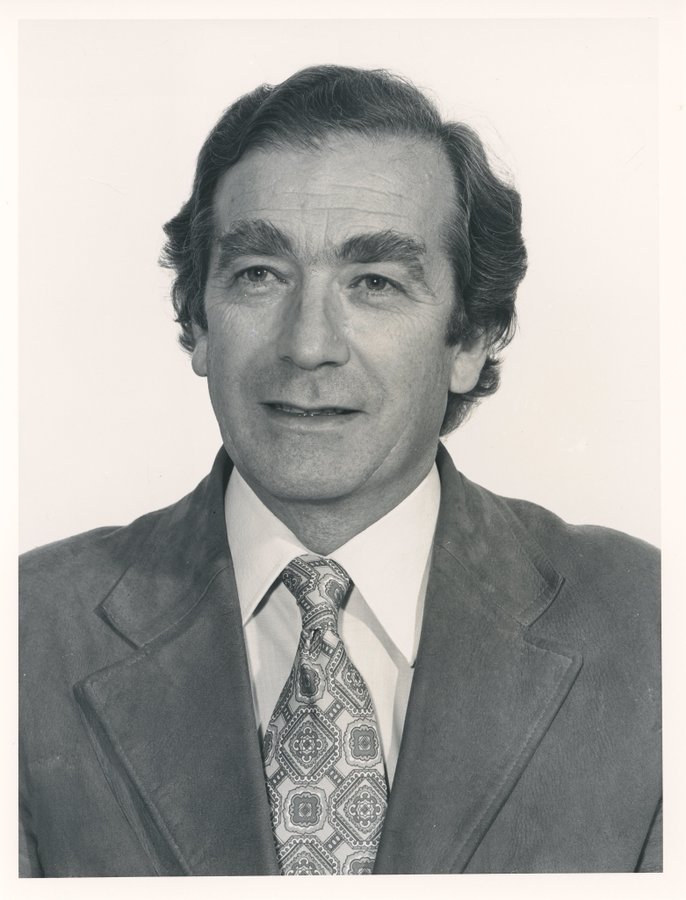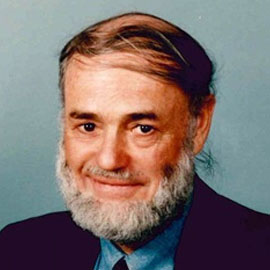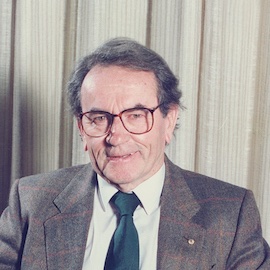Companion of the Order of Australia (AC)
Officer of the Order of Australia (AO)
International Member of the US National Academy of Engineering

27 October 1927 to 3 November 2021
In 1951, after completing his MSc in biochemistry at the University of Melbourne, Professor George Rogers joined the recently-established Biochemistry Unit of the CSIRO Wool Research Laboratories in Parkville. He was appointed Professor at the University of Adelaide from 1978 to 1992 and then Emeritus Professor. In 2005, Professor Rogers was also appointed a Professorial Fellow in the Department of Medicine, Faculty of Medicine at the University of Melbourne.
Professor Rogers was elected to the Academy in 1977 for his work on the molecular structure of keratins and the biochemistry of keratinisation. He was a pioneer in the application of electron microscopy to hair and wool ultrastructure and to that of the hair follicle, and his work includes the discovery of the existence of citrulline in keratin proteins. In recognition of his work, he was awarded a DSc from the University of Adelaide, the Lemberg Medal from the Australian Society for Biochemistry and Molecular Biology and he was made an Officer of the Order of Australia. Following his retirement, he continued his work but with a change of direction to research sheep transgenesis in order to make improvements in wool to benefit producers.
Professor Rogers gave his time generously to the Academy and made contributions to several committees. George was interviewed for the Academy in 2008 by Dr Bruce Fraser FAA.
Professor Rogers was an inspiration and role model to many and was renown as being very humble. He was greatly admired by his former students, many of whom became brilliant scientists and close family friends. His end-of-year events were attended by many of his former students and colleagues (including those based interstate or overseas) with the last one held in November 2019.

16 October 1938 to 23 January 2022
Professor Bill Budd was internationally known for his Antarctic and global climate research and was elected to the Academy in 1993 in recognition of his extensive research on polar ice, including his modelling of ice sheet changes through ice ages, simulations of the response of the present Antarctic Ice Sheet to climate change, and general circulation modelling of future warming.
Professor Budd had a natural ability to develop ideas and to translate physical observations into mathematical theories, as evident in his PhD thesis, ‘The Dynamics of Ice Masses’, which when published was widely recognised and used as an advanced glaciology text and translated into several languages.
From 1970, Professor Budd led the Antarctic Division’s newly established Glaciology Section, co-located within the Meteorology Department at the University of Melbourne, where he developed the Australian glaciological research program and initiated studies that, 50 years later, remain core to the present-day program.
In 1979 Professor Budd was appointed the first Professor of Meteorology at the University of Melbourne, where he remained until 1992 when he moved to Hobart to take up the position of Professor of Meteorology and Leader of the Polar Atmosphere Program at the newly established Antarctic Cooperative Research Centre. He was very actively involved in international scientific collaboration and was a leader in initiating (in 1968) and then implementing the International Antarctic Glaciological Project.
Professor Budd gave his time very generously to the Academy, consistently serving on (and chairing) numerous committees and panels on Antarctic research and on oceanic, climate and atmospheric sciences over 30 years.
Professor Budd dedicated his life to scientific progress and to the development of the next generation of scientists and following his retirement in the mid-2000s he continued his scientific work and mentoring. He was generous, supportive and kind to the very many postgraduate students and early career researchers that he mentored. His wisdom and wit will be remembered by his many friends and colleagues and his legacy will continue to benefit the many research programs that he initiated, and which continue today.
Thank you to Professor Ian Allison AO FAA for his input into this notice.

17 December 1924 to 12 February 2022
Professor Jim Quirk was a distinguished soil scientist, renowned for his studies of the properties of soil. He was elected to the Academy in 1973.
After graduating with a first-class honours degree in agricultural chemistry from the University of Sydney, Professor Quirk obtained a PhD in soil physics from the University of London. From 1947 to 1956 he was a Senior Research Officer in the Division of Soils at CSIRO and was then appointed Reader in Soil Science at the Waite Agricultural Research Institute, University of Adelaide. From 1963 to 1974, he was the Foundation Professor of Soil Science and Head of the Department of Soil Science and Plant Nutrition at the University of Western Australia.
Professor Quirk was a Fellow of the Australian Institute of Agricultural Science (AIAS) and the Royal Australian Chemical Institute. He received the JA Prescott Medal from Soil Science Australia, the AIAS Medal and the NSW Government’s Farrer Memorial Medal and Oration. He was made an Officer of the Order of Australia in 1981.
Professor Quirk received the ANZAAS Mueller Medal and the Distinguished Service Award from the American Society of Soil Science. He was made an Honorary Fellow of the International Union of Soil Sciences, and received honorary doctorates in agricultural science from the universities of Louvain, Western Australia, Melbourne and Sydney. In 2013 the European Journal of Soil Science included one of his papers from 1955 in their series of landmark papers.
Professor Quirk gave his time generously to the Academy, serving on many committees and on Council over the years.
© 2026 Australian Academy of Science